外研版英语初二 英语动词的时态填空练习题及解析推荐精选
外研版英语初二 英语动词的时态填空练习题含解析
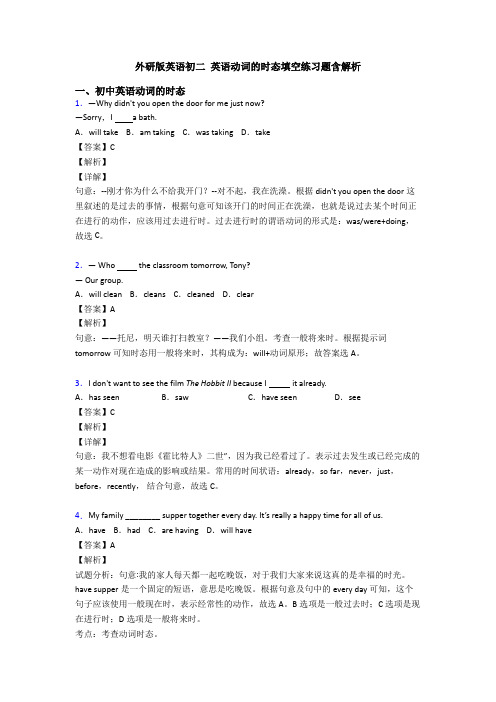
外研版英语初二英语动词的时态填空练习题含解析一、初中英语动词的时态1.—Why didn't you open the door for me just now?—Sorry,I a bath.A.will take B.am taking C.was taking D.take【答案】C【解析】【详解】句意:--刚才你为什么不给我开门?--对不起,我在洗澡。
根据didn't you open the door这里叙述的是过去的事情,根据句意可知该开门的时间正在洗澡,也就是说过去某个时间正在进行的动作,应该用过去进行时。
过去进行时的谓语动词的形式是:was/were+doing,故选C。
2.— Who the classroom tomorrow, Tony?— Our group.A.will clean B.cleans C.cleaned D.clear【答案】A【解析】句意:——托尼,明天谁打扫教室?——我们小组。
考查一般将来时。
根据提示词tomorrow可知时态用一般将来时,其构成为:will+动词原形;故答案选A。
3.I don't want to see the film The Hobbit II because I it already.A.has seen B.saw C.have seen D.see【答案】C【解析】【详解】句意:我不想看电影《霍比特人》二世”,因为我已经看过了。
表示过去发生或已经完成的某一动作对现在造成的影响或结果。
常用的时间状语:already,so far,never,just,before,recently,结合句意,故选C。
4.My family ________ supper together every day. It’s really a happy time for all of us. A.have B.had C.are having D.will have【答案】A【解析】试题分析:句意:我的家人每天都一起吃晚饭,对于我们大家来说这真的是幸福的时光。
外研版英语八年级英语∶英语动词的时态专练及答案

外研版英语八年级英语∶英语动词的时态专练及答案一、初中英语动词的时态1.He told me that he ________ here for five minutes.A.has comeB.had arrivedC.had beenD.had come【答案】C【解析】句意:他告诉我他到这儿5分钟了。
根据for five minutes可知谓语动词要用延续性动词,come和 arrive都是短暂性动词,be in+地点,表示延续性,here副词,要把介词省略;故选C2.The life we were used to _______ greatly since 1992.A.change B.have changed C.changing D.has changed【答案】D【解析】试题分析:句意:我们过去的生活自从1992年后有了巨大的变化。
本题需要断句正确,we were used to作句子主语的定语,句子缺少谓语动词,根据时间状语since 1992,可知句子的谓语用现在完成时态,主语是the life 用第三人称has changed,故选D。
考点:考查完成时态的用法。
3.—I know you ______ to China many years ago. And how long have you ______ in China ?—I don’t remember it exactly.A.come; live B.came; comeC.come; come D.came; lived【答案】D【解析】句意:-我知道你多年前就来中国了。
你在中国住了多久了?-我记不太清了。
根据过去时间短语many years ago可知,谓语动词使用过去式came。
how long与持续性动词连用,live 是持续性动词,come暂时性动词。
根据语境可知,本句为现在完成时态,所以动词使用过去分词lived。
外研版英语初二年级英语英语动词的时态知识点及答案

外研版英语初二年级英语英语动词的时态知识点及答案一、初中英语动词的时态1.—Why didn't you open the door for me just now?—Sorry,I a bath.A.will take B.am taking C.was taking D.take【答案】C【解析】【详解】句意:--刚才你为什么不给我开门?--对不起,我在洗澡。
根据didn't you open the door这里叙述的是过去的事情,根据句意可知该开门的时间正在洗澡,也就是说过去某个时间正在进行的动作,应该用过去进行时。
过去进行时的谓语动词的形式是:was/were+doing,故选C。
2.She ________on the phone,so I just smiled at her and went away.A.has talked B.was talking C.will talk D.is talking【答案】B【解析】【详解】句意:她正在打电话,所以我只是朝她笑笑就走了。
考查动词时态辨析。
so所以,表结果;根据so I just smiled at her and went away,可知她正在打电话,需用过去进行时,故选B。
3.— The boy misses his parents very much.— So he does. They _________ the hometown for nearly two years.A.have left B.has left C.have been away from D.will leave【答案】C【解析】【详解】句意:——那个男孩非常想念他的父母。
——他的确是。
他们离开家乡几乎两年了。
leave 离开,是短暂性动词,不与时间段连用;be away离开,与时间段连用。
此处接时间段for nearly two years连用,故用延续性动词,故选C。
外研版英语初二 英语动词的时态填空练习题含答案推荐精选

外研版英语初二英语动词的时态填空练习题含答案推荐精选一、初中英语动词的时态1.--Where is Grace?--She with her brother playing basketball at school.A.is practice B.is practicing C.are practicing D.are practice【答案】B【解析】句意:——格雷斯在哪里?——她正在和她哥哥在学校练习打篮球。
be后跟现在分词,构成现在进行时态,此句的主语为she,with her brother做状语,be用is,故答案为B。
点睛:主语为单数名词或代词,尽管后面跟有with,together with,along with,as well as,besides,except,but,like等介词或介词短语时,谓语动词用单数形式。
例如:Mike with his father has been to England. 迈克同他的父亲去过英格兰。
Mike, like his brother, enjoys playing football. 迈克像他的哥哥一样喜欢踢足球。
2.--________ you _________ Kate’s letter yet? --Yes, I ________ it for several days. A.Did; receive; have received B.Have; received; have hadC.Have; received; have received D.Did; receive; have had【答案】B【解析】句意:-你收到凯特的信了吗? -是的,我已经收到好几天了。
本题为现在完成时态,receive动词,收到,暂时性动词。
在肯定的陈述句中,暂时性动词不能和一段时间连用,因而receive改为have,have为持续性动词,had过去分词;可以和for several days一段时间连用。
外研版英语八年级英语句型及语法(英语动词的时态)及答案解析
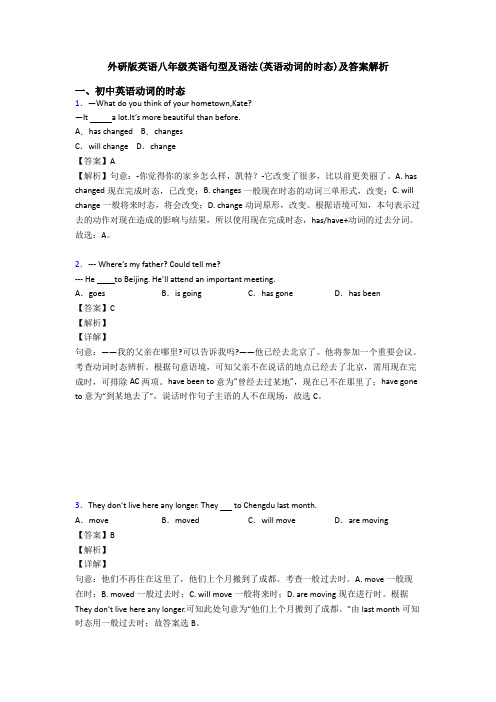
外研版英语八年级英语句型及语法(英语动词的时态)及答案解析一、初中英语动词的时态1.—What do you think of your hometown,Kate?—It a lot.It’s more beautiful than before.A.has changed B.changesC.will change D.change【答案】A【解析】句意:-你觉得你的家乡怎么样,凯特?-它改变了很多,比以前更美丽了。
A. has changed现在完成时态,已改变;B. changes一般现在时态的动词三单形式,改变;C. will change一般将来时态,将会改变;D. change动词原形,改变。
根据语境可知,本句表示过去的动作对现在造成的影响与结果,所以使用现在完成时态,has/have+动词的过去分词。
故选:A。
2.--- Where’s my father? Could tell me?--- He to Beijing. He’ll attend an important meeting.A.goes B.is going C.has gone D.has been【答案】C【解析】【详解】句意:——我的父亲在哪里?可以告诉我吗?——他已经去北京了。
他将参加一个重要会议。
考查动词时态辨析。
根据句意语境,可知父亲不在说话的地点已经去了北京,需用现在完成时,可排除AC两项。
have been to意为“曾经去过某地”,现在已不在那里了;have gone to意为“到某地去了”,说话时作句子主语的人不在现场,故选C。
3.They don’t live here any longer. They to Chengdu last month.A.move B.moved C.will move D.are moving【答案】B【解析】【详解】句意:他们不再住在这里了,他们上个月搬到了成都。
外研版英语初二年级英语英语动词的时态知识点含答案解析

外研版英语初二年级英语英语动词的时态知识点含答案解析一、初中英语动词的时态1.I don't remember____________ the book yesterday.A.where I put B.where did I putC.where will I put D.where l will put【答案】A【解析】英语宾语从句中一般为陈述语序。
根据时间状语yesterday,昨天,可知从句中描述的是过去发生的动作,故从句中用一般过去时态。
选B为倒装语序,故选A。
考点:宾语从句2.She ________on the phone,so I just smiled at her and went away.A.has talked B.was talking C.will talk D.is talking【答案】B【解析】【详解】句意:她正在打电话,所以我只是朝她笑笑就走了。
考查动词时态辨析。
so所以,表结果;根据so I just smiled at her and went away,可知她正在打电话,需用过去进行时,故选B。
3.―Eric, can you bring me the scissors? ―Just a moment. I the paper-cutting with it. A.make B.madeC.am making D.has made【答案】C【解析】句意:——Eric,你能给我带来剪刀吗?——等一会儿。
我正在用它做剪纸。
根据Justa moment可知此处表示让对方等一会儿,应是正在使用这个剪刀,故用现在进行时be doing,故选C。
4.– Would you like to watch The Great Wall 《长城》with me?-- Certainly. I don’t mind ________ it again although I ______ it twice.A.to see, saw B.seeing, have seen C.to see, have seen D.seeing, saw【答案】B【解析】句意:——你愿意跟我去看《长城》吗?——当然了,尽管我已经看了两遍,但我不会介意再去看一遍。
外研版英语初二 英语动词的时态填空练习题附解析百度文库

外研版英语初二英语动词的时态填空练习题附解析百度文库一、初中英语动词的时态1.— Where is Mr. Wu?— He together with his students __________ singing by the lake .A.is practising B.are practising C.will practise D.would practise【答案】A【解析】【详解】句意:——胡先生在哪里?——他和他的同学们一起在湖边练习唱歌。
A. is practising正在练习;单数; B. are practising正在练习,复数;C. will practise将去练习;一般将来时;D. would practise会去练习,过去将来时。
根据上文Where is Mr. Wu? 可知下文用现在进行时,其结构是be doing的形式,主语是he, together with his students在句中做状语;这里be动词用is。
根据题意,故选A。
2.--________ you _________ Kate’s letter yet? --Yes, I ________ it for several days. A.Did; receive; have received B.Have; received; have hadC.Have; received; have received D.Did; receive; have had【答案】B【解析】句意:-你收到凯特的信了吗? -是的,我已经收到好几天了。
本题为现在完成时态,receive动词,收到,暂时性动词。
在肯定的陈述句中,暂时性动词不能和一段时间连用,因而receive改为have,have为持续性动词,had过去分词;可以和for several days一段时间连用。
故选:B。
3.— What are you doing now, Kate?— I an email to my friend.A.write B.am writing C.wrote D.have written【答案】B【解析】句意:——凯特你在做什么?——我正在给我的朋友写电子邮件。
外研版英语初二 英语现在完成时填空练习题含解析推荐精选
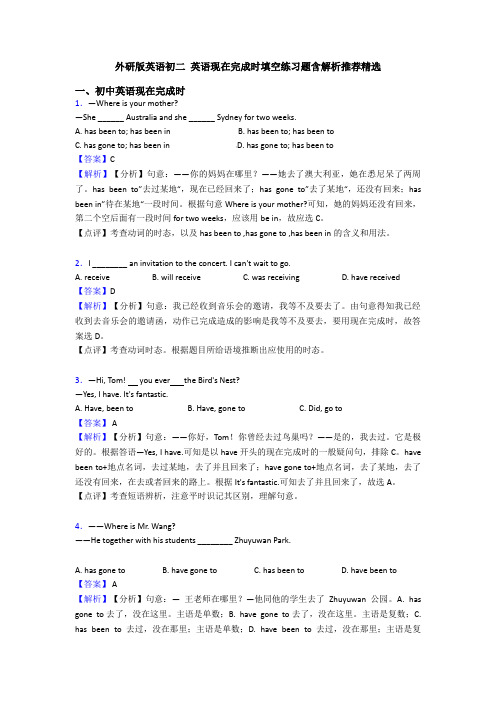
外研版英语初二英语现在完成时填空练习题含解析推荐精选一、初中英语现在完成时1.—Where is your mother?—She ______ Australia and she ______ Sydney for two weeks.A. has been to; has been inB. has been to; has been toC. has gone to; has been inD. has gone to; has been to【答案】C【解析】【分析】句意:——你的妈妈在哪里?——她去了澳大利亚,她在悉尼呆了两周了。
has been to”去过某地“,现在已经回来了;has gone to”去了某地“,还没有回来;has been in”待在某地“一段时间。
根据句意Where is your mother?可知,她的妈妈还没有回来,第二个空后面有一段时间for two weeks,应该用be in,故应选C。
【点评】考查动词的时态,以及has been to ,has gone to ,has been in的含义和用法。
2.I ________ an invitation to the concert. I can't wait to go.A. receiveB. will receiveC. was receivingD. have received【答案】D【解析】【分析】句意:我已经收到音乐会的邀请,我等不及要去了。
由句意得知我已经收到去音乐会的邀请函,动作已完成造成的影响是我等不及要去,要用现在完成时,故答案选D。
【点评】考查动词时态。
根据题目所给语境推断出应使用的时态。
3.—Hi, Tom! you ever the Bird's Nest?—Yes, I have. It's fantastic.A. Have, been toB. Have, gone toC. Did, go to【答案】 A【解析】【分析】句意:——你好,Tom!你曾经去过鸟巢吗?——是的,我去过。
外研版英语初二 英语现在完成时填空练习题附答案解析百度文库
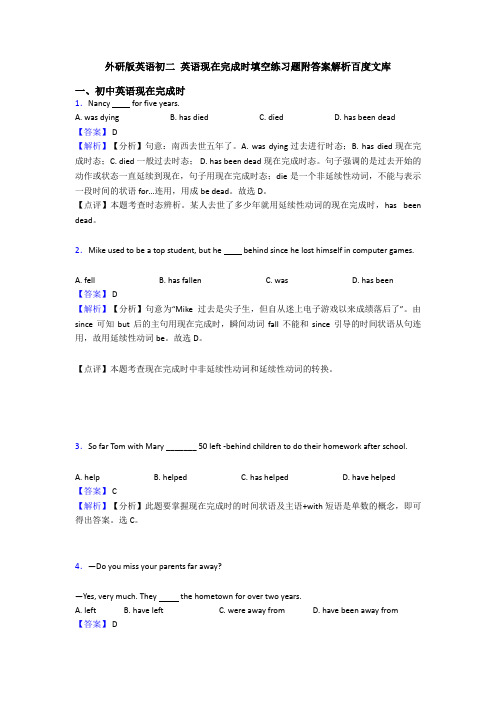
外研版英语初二英语现在完成时填空练习题附答案解析百度文库一、初中英语现在完成时1.Nancy for five years.A. was dyingB. has diedC. diedD. has been dead【答案】 D【解析】【分析】句意:南西去世五年了。
A. was dying过去进行时态;B. has died现在完成时态;C. died一般过去时态; D. has been dead现在完成时态。
句子强调的是过去开始的动作或状态一直延续到现在,句子用现在完成时态;die是一个非延续性动词,不能与表示一段时间的状语for…连用,用成be dead。
故选D。
【点评】本题考查时态辨析。
某人去世了多少年就用延续性动词的现在完成时,has been dead。
2.Mike used to be a top student, but he behind since he lost himself in computer games.A. fellB. has fallenC. wasD. has been【答案】 D【解析】【分析】句意为“Mike过去是尖子生,但自从迷上电子游戏以来成绩落后了”。
由since可知but后的主句用现在完成时,瞬间动词fall不能和since引导的时间状语从句连用,故用延续性动词be。
故选D。
【点评】本题考查现在完成时中非延续性动词和延续性动词的转换。
3.So far Tom with Mary _______ 50 left -behind children to do their homework after school.A. helpB. helpedC. has helpedD. have helped【答案】 C【解析】【分析】此题要掌握现在完成时的时间状语及主语+with 短语是单数的概念,即可得出答案。
选C。
4.—Do you miss your parents far away?—Yes, very much. They the hometown for over two years.A. leftB. have leftC. were away fromD. have been away from【答案】 D【解析】【分析】根据句意“他们已经离家两年多了”可知用现在完成时,时间状语for over two years 表示时间段,动词要具有延续性,left是 leave的过去分词,是短暂性动词,不能和时间段连用,故选D。
外研版英语初二 过去完成时填空练习题附答案解析推荐精选
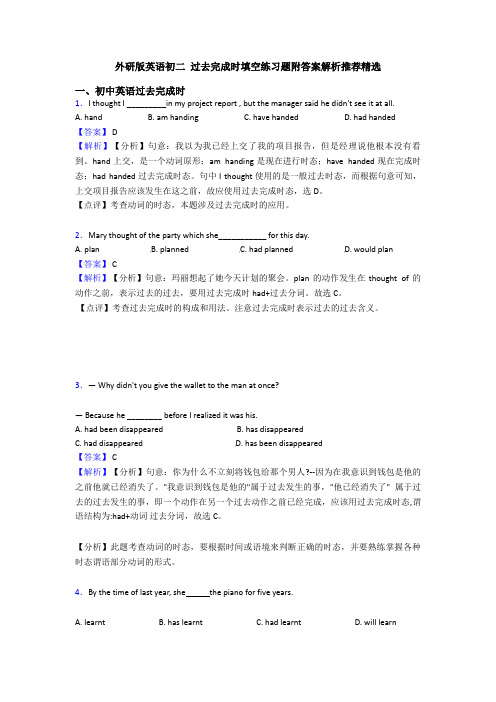
外研版英语初二过去完成时填空练习题附答案解析推荐精选一、初中英语过去完成时1.I thought I _________in my project report , but the manager said he didn't see it at all.A. handB. am handingC. have handedD. had handed【答案】 D【解析】【分析】句意:我以为我已经上交了我的项目报告,但是经理说他根本没有看到。
hand上交,是一个动词原形;am handing是现在进行时态;have handed现在完成时态;had handed过去完成时态。
句中I thought使用的是一般过去时态,而根据句意可知,上交项目报告应该发生在这之前,故应使用过去完成时态,选D。
【点评】考查动词的时态,本题涉及过去完成时的应用。
2.Mary thought of the party which she___________ for this day.A. planB. plannedC. had plannedD. would plan【答案】 C【解析】【分析】句意:玛丽想起了她今天计划的聚会。
plan的动作发生在thought of的动作之前,表示过去的过去,要用过去完成时had+过去分词。
故选C。
【点评】考查过去完成时的构成和用法。
注意过去完成时表示过去的过去含义。
3.— Why didn't you give the wallet to the man at once?— Because he ________ before I realized it was his.A. had been disappearedB. has disappearedC. had disappearedD. has been disappeared【答案】 C【解析】【分析】句意:你为什么不立刻将钱包给那个男人?--因为在我意识到钱包是他的之前他就已经消失了。
外研版英语初二 英语现在完成时填空练习题及答案解析
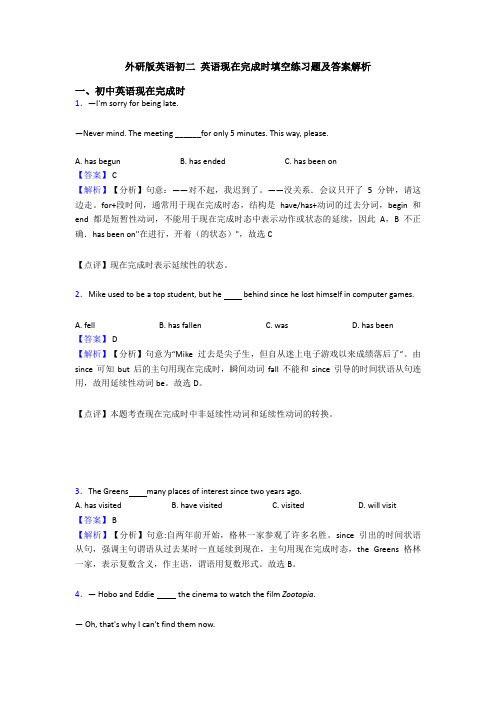
外研版英语初二英语现在完成时填空练习题及答案解析一、初中英语现在完成时1.—I'm sorry for being late.—Never mind. The meeting ______for only 5 minutes. This way, please.A. has begunB. has endedC. has been on【答案】 C【解析】【分析】句意:——对不起,我迟到了。
——没关系.会议只开了5分钟,请这边走。
for+段时间,通常用于现在完成时态,结构是have/has+动词的过去分词,begin和end都是短暂性动词,不能用于现在完成时态中表示动作或状态的延续,因此A,B不正确.has been on"在进行,开着(的状态)",故选C【点评】现在完成时表示延续性的状态。
2.Mike used to be a top student, but he behind since he lost himself in computer games.A. fellB. has fallenC. wasD. has been【答案】 D【解析】【分析】句意为“Mike过去是尖子生,但自从迷上电子游戏以来成绩落后了”。
由since可知but后的主句用现在完成时,瞬间动词fall不能和since引导的时间状语从句连用,故用延续性动词be。
故选D。
【点评】本题考查现在完成时中非延续性动词和延续性动词的转换。
3.The Greens many places of interest since two years ago.A. has visitedB. have visitedC. visitedD. will visit【答案】 B【解析】【分析】句意:自两年前开始,格林一家参观了许多名胜。
since引出的时间状语从句,强调主句谓语从过去某时一直延续到现在,主句用现在完成时态,the Greens格林一家,表示复数含义,作主语,谓语用复数形式。
- 1、下载文档前请自行甄别文档内容的完整性,平台不提供额外的编辑、内容补充、找答案等附加服务。
- 2、"仅部分预览"的文档,不可在线预览部分如存在完整性等问题,可反馈申请退款(可完整预览的文档不适用该条件!)。
- 3、如文档侵犯您的权益,请联系客服反馈,我们会尽快为您处理(人工客服工作时间:9:00-18:30)。
外研版英语初二英语动词的时态填空练习题及解析推荐精选一、初中英语动词的时态1.The students of Class 5 trees in the park every year.A.plant B.will plant C.planted D.plants【答案】A【解析】【详解】句意:五班的学生每年在公园植树。
根据时间状语every year句子应该用一般现在时,句子的主语students是复数形式,所以谓语动词用原形。
故选A。
2.--- I we nt to see you last night, but you weren’t in. Where were you then?---I _______ a walk by the river.A.had B.was having C.have had D.have【答案】B【解析】【详解】句意:——昨晚我去看你了,但你不在。
那时你在哪里?——我在河边散步。
由上文中“Where were you then?”可知,问句是询问“昨天晚上当我去看望你的时候,你正在哪里?”此句表达的是过去正在发生的事情,要用过去进行时态。
故答案为B。
3.—Do you mind beside you, sir?— . I alone to enjoy the music.A.my sitting; Better not; used to sitB.my to sit; Of course not; am used to sittingC.me sitting; I’m sorry but I do; have been used to sittingD.me to sit; Never mind; was used to sitting【答案】C【解析】句意:你介意我坐在你旁边吗,先生?——对不起,我确实介意,我习惯了独自坐着欣赏音乐。
mind doing sth.介意做某事,doing前面可以用形容词性物主代词或代词的宾格,首先排除B,D;used to do过去常常做某事,be used to doing sth.习惯于做某事,根据后面的句子判断,对于坐在身边表示介意,故答案为C。
4.– Would you like to watch The Great Wall 《长城》with me?-- Certainly. I don’t mind ________ it again although I ______ it twice.A.to see, saw B.seeing, have seen C.to see, have seen D.seeing, saw【答案】B【解析】句意:——你愿意跟我去看《长城》吗?——当然了,尽管我已经看了两遍,但我不会介意再去看一遍。
mind doing sth.介意做某人,结合句意,首先排除A,C;根据"I don't mind ___ it again"和"although"可知尽管我已经看了两遍,但我不会介意再去看一遍.所以看过两遍用现在完成时,答案选B。
5.—Do you think if Tom _____the work well tomorrow?—I think he will if he ______his best.A.does, will try B.will do, tries C.does, tries D.will do, will try【答案】B【解析】【详解】句意:-你认为明天Tom是否会把工作做好?-我认为如果他尽他的最大努力,他会做好的。
does做,第三人称单数形式;will do将会做,一般将来时态;will try将会努力,一般将来时态;tries一般现在时态,第三人称单数形式。
根据句意可知,第一句话中if是“是否”,引导宾语从句,从句中有tomorrow,表示将来的事情,故用一般将来时态will do;第二句话if是“如果”,引导条件状语从句,从句中用一般现在时,主句用一般将来时态,主语是he第三人称单数,故用tries。
选B。
6.Neither Amy nor her parents ______ to Australia, but _______ of them know Australian customs very well.A.have been, all B.have been, both C.has been, neither D.has been, none 【答案】B【解析】句意:艾米和她的父母都没去过澳大利亚,但他们都很了解澳大利亚的风俗习惯。
考查动词时态和不定代词辨析题。
Neither A nor B,表示两者都没有/都不,遵循就近原则;空格前面的parents(父母)是复数形式,不可用has,可排除CD两项。
all全都;both两者都,Amy和her parents是两个方面,需用both。
根据句意语境,可知选B。
7.—Mum, where is my dictionary?—Oh, I didn’t see it, either. I’m afraid you ___________ it.A.are losing B.will lose C.have lost D.were losing【答案】C【解析】句意:——妈妈,我的字典在哪里?——哦,我也没有看到它,恐怕你把它弄丢了。
A. are losing现在进行时态; B. will lose一般将来时态;C. have lost现在完成时态; D. were losing 过去进行时态。
lose这一动词发生在过去,造成的结果是现在看不见了,属于完成的动作,要用现在完成时态来表达,故答案为C。
8.— Do you know _____ a wonderful match and two basketball matches on July 15 th ?— Yeah . I am going to watch them on that day.A.there will be B.there is going to have C.there are going to be D.is there going to be【答案】A【解析】【详解】句意:——你知道7月15日会有一场精彩的比赛和两场篮球赛吗?——是的。
那天我要去看它们。
考查there be结构。
宾语从句需用陈述句语序,D是疑问句语序,可排除。
根据句意语境,本句用一般将来时。
there be 结构的一般将来时用there will be 和there is going to be,表示最近要做的事,可排除B。
根据就近原则,a wonderful match一场精彩的比赛,需用there is going to be,可排除C项。
综合以上,可知选A。
9.— Could you tell me ________? I must find him.— Sorry. I have no idea. But he was here just now.A.where Tom was B.where Tom has goneC.where can I find Tom D.where Tom has been【答案】B【解析】【详解】句意:——你能告诉我汤姆去哪儿了吗?我必须找到他。
——对不起,我不知道。
但他刚才在这里。
本题主要考查宾语从句。
根据语境,你能告诉“我”汤姆在哪里吗。
where 引导的宾语从句在句中作 tell 的直接宾语,me 为间接宾语。
宾语从句使用陈述语序,故此处应用“where + 主语 + 谓语”的结构,主语为 Tom,谓语为 be 动词。
故排除C项。
根据语境时态和主句时态保持一致Could you tell me表示请求允许后用现在完成时,has gone是指去某地,没回来;has been指从某地回来了。
结合语境可知,是指Tom去了某地。
故选B。
10.—Why are you walking so quickly, Edward?—There_____ a talent show in ten minutes.A.will have B.will beC.is going to have D.are going to be【答案】B【解析】【分析】考点:考查一般将来时。
【详解】试题分析:句意:——你为什么走那么快,爱德华?——十分钟后就有个才艺表演。
根据时间状语in then minutes十分钟后,句子要用一般将来时;句型there be有……;其一般将来时结构为there will be或there is/are going to be,根据主语a talent show单数,所以用is,故C和D不对,故选B。
11.—What do you think of your hometown,Kate?—It a lot.It’s more beautiful than before.A.has changed B.changesC.will change D.change【答案】A【解析】句意:-你觉得你的家乡怎么样,凯特?-它改变了很多,比以前更美丽了。
A. has changed现在完成时态,已改变;B. changes一般现在时态的动词三单形式,改变;C. will change一般将来时态,将会改变;D. change动词原形,改变。
根据语境可知,本句表示过去的动作对现在造成的影响与结果,所以使用现在完成时态,has/have+动词的过去分词。
故选:A。
12.They don’t live here any longer. They to Chengdu last month.A.move B.moved C.will move D.are moving【答案】B【解析】【详解】句意:他们不再住在这里了,他们上个月搬到了成都。
考查一般过去时。
A. move一般现在时;B. moved一般过去时;C. will move一般将来时;D. are moving现在进行时。
根据They don’t live here any longer.可知此处句意为“他们上个月搬到了成都。
”由last month可知时态用一般过去时;故答案选B。
13.—Could you tell me what he said just now?—Sorry, I ________ what was happening outside.A.have thought B.was thinking C.thought D.think【答案】B【解析】试题分析:句意:——你能告诉我他刚才说的什么吗?——对不起,我正在想外面发生了什么事。
